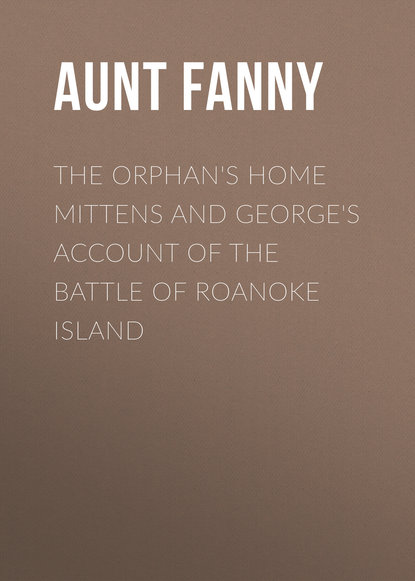По всем вопросам обращайтесь на: info@litportal.ru
(©) 2003-2024.
✖
The Orphan's Home Mittens and George's Account of the Battle of Roanoke Island
Настройки чтения
Размер шрифта
Высота строк
Поля
"The kingdom of heaven is like to a grain of mustard seed, which a man took and sowed in his field:
"Which, indeed, is the least of all seeds; but when it is grown, it is the greatest among herbs; and becometh a tree, so that the birds of the air come and lodge in the branches thereof."
Just like a grain of mustard seed did this great charity begin.
More than ten years ago, a poor man lay in a miserable bed, dying. His little children were weeping at his bedside, for their mother had gone to heaven long before; and they did not know who to look to for food and shelter, when they should be orphans.
"Oh, that I could take you with me, my poor little children!" moaned the dying father.
Just then a lady entered the room. She had accidentally heard of the man who had been ill so long, and she had come in to help him.
She spoke to him in a voice of so much kindness, that he started up, crying, "Oh, madam! I want nothing for myself! but I would get on my knees to you for my children. I cannot die peacefully, thinking of the poverty and dreadful temptations to which they will be exposed. Left alone, orphans and penniless, who is to teach them the way to heaven?"
"Take comfort, my poor friend," said the kind lady, "your children shall not suffer want."
"But will they be taught to know and love their Saviour?" he asked, looking at her with an expression of intense anxiety.
"Yes, I will see that they are religiously brought up."
"Promise me!" he said in a hoarse whisper, for the excitement had exhausted him, and he lay panting for breath.
"I promise," answered the lady solemnly.
A thankful smile flitted over the wasted features; and looking up, he murmured, "Thank God, I die happy."
A comfortable room was hired, and the children were placed in the care of a kind and pious woman. The little orphans soon became contented and happy. You see them in the picture, playing on the floor. The good woman went out to make some purchases, which the boy just coming in has brought; a young girl is staying with the children until their kind nurse returns.
This is the grain of mustard seed. But before long, more children became inmates of this one room, and the Right Reverend Bishop Wainwright and the other good people became interested in this truly Christian work. They soon found that there was no home for destitute, outcast children, when their natural parents were taken away, who belonged to the Church by baptism. There were not enough Orphan Asylums in this city; for numbers were brought to them, who could not get into these other institutions, because they were full. It seemed as if God himself had called upon them in behalf of these little ones. And thus it was that this institution began.
Then the good Bishop Wainwright, who is now gone home to heaven, became President; Rev. Dr. Hawks, Vice-President; and a number of excellent clergymen and gentlemen were the managers, while as many ladies were formed into a Ladies' Committee.
The grain of mustard seed had sprung up, and its leaves unfolding more and more, made it necessary to find a larger space for it to grow. So a three-story house in Hammond street was taken, and before long, twenty happy children were living there.
Oh, how hard the ladies worked in those few first years! The money came slowly in; but they never grew fainthearted. More and more poor little orphans came to their door, begging for a home, and the living care which their own mothers, dead and gone, could never more bestow. The house was soon filled, and a more contented family of children could nowhere be found. The kind matron loved them all, and worked with the teacher night and day to make them good and happy.
The "Orphan's Home," as it was now called, continued for some years in Hammond street. Then it was removed to two houses in West Thirty-ninth street, and the ladies who had formed the committee now became the officers, with the Right Reverend Bishop Potter and a number of clergymen and gentlemen to advise them. Bishop Potter, you know, had taken the place of the late excellent Bishop Wainwright; whom I esteemed and respected more than I have words to express. I wish, my darlings, you could have heard him read the parables of our Saviour; or the glorious promises contained in the gospels. Their deep and blessed meaning, coming from his lips, seemed so simple and clear, for he read them with such admirable emphasis and point. I never listened to his preaching or reading, without a thrill in my heart, and the tears often dwelling in my eyes. It was at the request of his good and lovely daughter, for whom I have a sincere and warm affection, and who was at the time treasurer of the Orphan's Home, and one of its very best and most generous friends, that I became a manager.
You would have thought that two large houses would have been room enough; but our grain of mustard seed was now a great tree, in the branches of which many more little orphan birds must have a warm nest, and be lodged and fed; and, above all, taught the Way of Life. But there was no room. The ladies who composed the Board of Managers put their wise heads together, and concluded to ask all good Christian people to help them. How could they turn away from the cry of these little desolate ones, when the Good Shepherd and His servants in the work, these kind ladies, were ready with heart and hand to watch over and protect a larger flock of these His poor little lambs?
But there was no room!
The appeal was made, and with grateful joy they saw the money flowing into the trustees' hands in loving streams. Soon enough was collected to warrant the commencing of the building, in whose wide halls and great airy rooms hundreds of motherless and fatherless children could live, and move, and play.
On the 2d of October, 1860, the corner-stone was laid. For fear you might not know exactly what laying a corner-stone means, I will tell you as well as I can.
When a large building is to be put up, the foundation is dug, and a very large square stone is placed in one of the corners, which stone has a small hollow in the top of it.
When this much has been done, everybody interested is invited to the place, and religious services are performed in the open air, the people standing reverently around.
Then the Declaration of Independence, the daily newspapers, the coins that are in circulation for money, the previous history of the institution, if it has any, and everything else that may seem proper or interesting to the occasion, is placed in the hole. The most distinguished person present takes a trowel and some mortar and closes it up. On this the wall of the building is laid.
If, in after years, it should be pulled down, it would be very interesting to take out and look over the things that have been buried so long in the corner-stone.
I was not present when our corner-stone was laid, and I never saw the ceremony; but I believe I have given you the right idea about it.
While the new Home was building, the children were well and happy in Thirty-ninth street.
We had some little ones, whose histories were very sad. There was George Floyd, whose father was mate of a vessel which must have been wrecked and lost at sea, for she went out from New York, and was never more heard from.
And there was little Dickey, who had a cruel stepmother. She ordered him to make a fire in the stove; his clothes caught the flame, and he was dreadfully burned. The bad stepmother did nothing to heal the wounds, and he was found in this state, suffering terrible pain, and brought to the Home, and tenderly nursed till he got well.
And little Mary Canard, who took care of her dying mother, though she was only six years old, whose father was killed on Captain Peak's vessel. And one dear little boy we lost. He was twelve years old, and very good and intelligent. He had that dreadful and almost always fatal illness, membranous croup: – a kind of false skin very thick and tough grows in the throat, so that it becomes impossible to breathe or swallow. The poor little fellow seemed to realize that he was going to die. He told his belief to his kind nurses, and said, "Oh, how I wish I had been confirmed! how I wish I had promised God that I would try to lead a good life and keep His commandments."
At his request Bishop Southgate, who has always been very kind to the children, was sent for. He read and prayed with him; then laying his hands softly on the dying boy's head, implored a blessing for him.
A joyful light beamed from the little fellow's eyes; his whole countenance became irradiated with happiness, and in accents of grateful delight he exclaimed, "Oh, the bishop has blessed me!" In a few hours afterward his Saviour called him, and his gentle spirit passed away from earth, to love and serve God forever in heaven.
All the rest of our children kept in excellent health, and most of them were good and obedient. The ladies worked very hard, and, with God's blessing, all things went on well.
It was in the winter of this year, 1860, that I became a manager; and, you may be sure, I soon coaxed the ladies who had been in the institution longest, to tell me what I have already written.
In the latter part of April, 1861, the grand move took place; and on the night of the 22d, the orphans slept in two splendid great rooms called dormitories. Nice little iron bedsteads had been provided, with comfortable mattresses, sheets, blankets, and white dimity spreads; and they looked so cosy and comfortable I should have liked to have slept there myself. The boys have the dormitory nearest Lexington avenue, and the girls the other. Opening out of each is a nice large washroom, with dear little bath tubs, wash basins, &c., just as comfortable as it can possibly be. On the same floor are the matron's and teacher's rooms, and some very large closets, where all the children's clothes are kept.
Of course, as soon as we got a little bit settled, we determined to have a reception, and give all the friends we invited a first-rate time. We knew they would like it all the better if they could help us along when they made us this visit: so we got up a beautiful little fair and refreshment table.
Oh, how kind everybody was! If I dared I would tell you the names of all the ladies, who made all manner of pretty things, and sent in oysters, ice cream, cakes, and almost everything good to eat that was ever heard of; but these lovely Christian people prefer to do good in secret. If I were to have their names printed they might pinch my ears, and I should not like that. But I will tell you this much. I went and only just asked Rev. Dr. Dyer, of the Evangelical Knowledge Society, to give the orphan's fair some books, and he said "Yes" so quickly that I was astonished, and began to believe that there were some people in the world who were really glad to be asked to do a kindness for others. Then I went to the Episcopal Sunday School Union, and just asked for books there, and they, too, said "Yes," right away; and then I went to your friends the Messrs. Appleton, and they, too, said "Yes," immediately; and that night three great packages of books came up for the Orphan's Home. Did you ever hear of any thing kinder?
I believe I must tell you of some of the rest. There was one of our managers, a lovely young lady with beautiful brown eyes, who seemed to feel as if she never could do enough. I don't know what she did not give; for so many presents came in her name that there seemed to be no end to them. She even furnished the little recitation room entirely, and bought quite an apothecary shop of medicines, so that the children might have plenty when they were ill.
Then the young ladies of the "Helping Hand of St. Mark's Church" sent us a number of beautiful things. One of our managers, who had a fine conservatory, sent in a quantity of flowers, which we made into bouquets, and put into baskets, and sold for a good deal of money. We had a present of a flagstaff from Mr. Niblo, of Niblo's Garden, and one of the lady managers gave us the flag, and on the reception day it was waving over the Home. It would fill several pages to tell all the nice things that came – so I will hasten on.
We had a three days' reception in one of the great rooms, the 14th, 15th, and 16th of May. They were opened on the first day with religious services, and were all delightful. We had the carpenters to come and build tiers of seats at the lower end of the room, one above the other, reaching nearly to the ceiling; and each day the orphans marched in two and two, and were placed in the seats, to see all that was going on. Sometimes they would sing hymns for us, and other times they sang "Jim Crack Corn" and "Dixie," and other funny songs.
One day a kind lady gave them each a ten cent piece, and they came down in a great hurry to spend them immediately. We managed to have a good many things to cost only ten cents that were marked much higher, so that the dear little things should have just what they fancied.
Then a gentleman gave them each a chance, which he paid for, in a great cake; and I wish you could have heard the clapping of hands, and hurrahing, when a boy they all liked won it. Of course he gave them all a piece, and they enjoyed it tremendously. I really was afraid some of them would be ill, they had so much cake and candy.
The great fun of all to the children was to eat philopenas with the ladies. I do believe I eat about twenty-five. Of course I never meant to catch them; but I pretended to be very much astonished when they caught me, and when I went home to my dinner I got a basket, and put in it twenty-five great rosy-cheeked apples to pay for my philopenas. I thought these were much better for them than so much candy; and when I handed them out, the children looked highly delighted.
When the fair was over, we were surprised to find how much money we had taken, and very grateful too. Some of our pretty things were left, and we put these carefully by for our winter fair; and after a little while we settled down quite comfortably in the new Home.
The summer passed quietly away; everything seemed to go on happily, although we had very hard work to collect money enough to keep us out of debt. You see the terrible war was now raging, and all the charitable institutions were suffering, because everybody was anxious to do all they could for the soldiers.
We took three children belonging to volunteers who had no one to leave them with, and we had one poor little fellow from Fort Sumter. He was born in the fort, and soon after abandoned by his mother, who became a very wicked woman. Then his father – who was a good soldier – was sent to Florida to help fight against the Indians, and was killed: and poor little Richard was left alone in the world, with no one to take care of him but an old woman, who washed the soldiers' clothes and worked in the fort. After the wicked and dreadful attack on the handful of half-starved soldiers, who were so heroically guarding their country's flag and honor, but who were forced to surrender, the brave Major Doubleday, hearing of our Home, sent the poor little fellow on to us, and we were very glad to give him shelter, and make him as happy as we could.
Here is a picture of that sad scene. The cannonading is still going on, while they are carrying away from the ramparts two wounded men. You see in the picture, they are feeling the heart of one of them, hoping that it still beats. Do you see the brave fellow who is planting the flag? I must tell you about him. He is a Mr. Hart. When Mrs. Anderson wanted to go on to Charleston to see her husband, whose health was very delicate, Mr. Hart escorted her. He stayed in the fort, and was there during the fight. When our glorious flag was shot down, Mr. Hart seized it, nailed it to a pole, bounded up on the ramparts, and planted it again, amidst the cheers of the men. I think it was a splendid thing to have done! General Anderson has that stained, torn, but priceless flag now; and he says he is only waiting to plant it once more with his own hands over Fort Sumter. He has one dear little boy, who is named Robert after him. I think Robbie, as they call him, ought to be a proud boy; for his father will leave him what is far above untold gold – a spotless and honorable name.
One dear little boy died at this time, who had formerly lived in the Home. He had been a long time ill with an incurable spine disease, and it had been thought better to remove him to St. Luke's Hospital, that noble charity, where delicate, refined ladies go to live as nurses. Here he had the tenderest care; but nothing could save his life; and shortly before he died, he sent to us begging us to let him see some of his little companions, to bid them good-by, and to entreat them to be good, so that they might meet him again in heaven. It was a peaceful, happy death.











